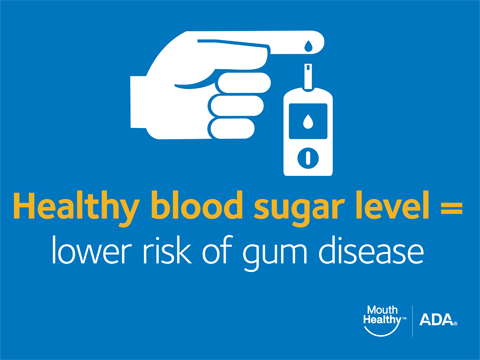 November is National Diabetes Awareness Month. More than 29 million Americans have it, but 8.1 million don’t even know they do. Diabetes takes a toll on your entire body, but it can also increase your risk of dental disease and other symptoms that show up in your mouth. In fact, one in five cases of total tooth loss is linked to diabetes.
November is National Diabetes Awareness Month. More than 29 million Americans have it, but 8.1 million don’t even know they do. Diabetes takes a toll on your entire body, but it can also increase your risk of dental disease and other symptoms that show up in your mouth. In fact, one in five cases of total tooth loss is linked to diabetes.
The good news is you can take charge of your health today. Controlling your blood sugar, brushing, flossing and visiting your dentist regularly can go a long way to help decrease the likelihood of developing these diabetes-related mouth issues.
Gum Disease
Notice some bleeding when you brush or floss? That may be an early sign of gum disease. If it becomes more severe, the bone that supports your teeth can break down, leading to tooth loss. Early gum disease can be reversed with proper brushing, flossing and diet. Research has shown gum disease can worsen if your blood sugar is not under control, so do your best to keep it in check.
Dry Mouth
Studies have found people with diabetes have less saliva, so you might find yourself feeling parched or extra thirsty. (Medications and higher blood sugar levels are also causes.) Fight dry mouth by drinking water. You can also chew sugarless gum and eat healthy, crunchy foods to get saliva flowing. This is especially important because extra sugar in your saliva, combined with less saliva to wash away leftover food, can lead to cavities.
Change in Taste
Your favorite flavors might not taste as rich as your remember if you have diabetes. It can be disappointing, but take the opportunity to experiment with different tastes, textures and spices to your favorite foods. Just take care not to add too much sugar to your food in an effort to add flavor. Not only can this affect the quality of your diet, it can also lead to more cavities. If you have a persistent bad taste in your mouth, see your dentist or doctor.
Infections
Diabetes affects your immune system, leaving you more vulnerable to infection. One common among people with diabetes is a yeast infection called oral thrush (candidiasis). The yeast thrive on the higher amount of sugar found in your saliva, and it looks like a white layer coating your tongue and the insides of your cheeks. Thrush is more common in people who wear dentures and can often leave a bad taste in your mouth. See your dentist if you think you have thrush or any other mouth infection.
Slow Healing
Have you ever noticed a cold sore or a cut in your mouth that doesn’t quite seem to go away? This can be another way that diabetes may affect your mouth. Poor control of blood sugar can keep injuries from healing quickly and properly. If you have something in your mouth that you feel isn’t healing as it should, see your dentist.



